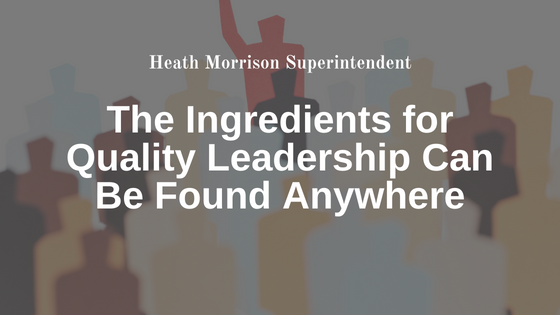Many people who know me are often surprised when I reference cooking shows when discussing leadership, which is, without a doubt, due to my self-described “palate of a three-year old.” While I may not eat a lot of what I observe on these cooking shows, I am always struck by the leadership lessons that can be gleaned from the various cooking networks and the talented chefs competing.
For example, there is a show called “Chopped” where contestants compete in three rounds with non-ideal – and in many cases, crazy – baskets of ingredients and very limited time. There is no time to complain when the chefs open their baskets and find goat brains, liver jam and fruit loops; they are expected to prepare an excellent dish. As school leaders we often find ourselves with limited resources that do not always align, and competing priorities from local, state and national entities. And, we are always racing against time to serve the needs of our students. Like these cooking contestants, we must focus on the ingredients we do have, trust in our training and experience, and prepare a quality educational experience for each child. When we do this, we get to advance. When we fail and falter, like these chefs, we can get chopped.
Gordon Ramsey is a celebrity chef featured on a variety of cooking shows. While his demeanor is not one that would work in a school setting, he is actually a teacher at heart. One consistent staple at all of his restaurants is risotto. While I have never had this dish, I know, from watching his shows, that it cannot be served too lumpy or too soupy. No matter how much pressure there is to get food out, Chef Ramsey will never falter on his “risotto test” and serve a dish to his customers that does meet his high standards. I often ask school based leaders about their “risotto test.” As superintendents, are we willing to accept lower standards for our employees and classrooms, or do we take a page from Gordon Ramsey’s book, unwilling to compromise on our “signature dish”? Our students deserve excellence and we should not compromise on our standards to serve them.
There is a show called “Restaurant Impossible” that has a renowned chef helping restaurant owners reimagine their failing establishment to meet changes in the community and customers they serve. The reasons these restaurants are failing are often the same reason so many schools are not succeeding; as the clientele changed the restaurant stayed exactly the same. A failure to innovate, coupled with greater competition that is more attuned to the community have these restaurants on the brink of going out of business. Many schools have lost significant enrollment to charters and voucher programs that seem more aligned to the needs of the students they are serving. School leaders need to encourage purposeful change and innovation and help schools learn how to market themselves; and to learn your brand is not what you say you are, but what people say about you. Making hard but needed changes, and getting better at marketing, can keep schools from the same fate as many failed restaurants.
Ultimately, the goal of every chef is to serve an extraordinary meal to every customer; no matter what their tastes or particular dietary restrictions may be. Just as they bring high standards, personalization and a combination of science and art to their work, we must do the same in public education so that every student feels welcome at “the table” and gets an extraordinary education that was crafted and “cooked” to meet their needs.

